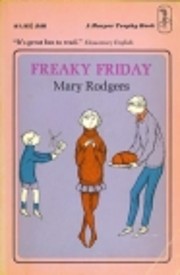

Click on a thumbnail to go to Google Books.
|
Loading... Freaky Friday (original 1972; edition 1972)by Mary Rodgers (Author)
Work InformationFreaky Friday by Mary Rodgers (1972)

Favorite Childhood Books (512) » 14 more 1970s (89) Movie Adaptations (30) Elevenses (149) Books Read in 2016 (2,926) Books Read in 2011 (45) Edward Gorey Covers (30) No current Talk conversations about this book. I've seen just about every version of the movie adaptations of this book, but have never had the opportunity to read the original story until now. This particular copy was left in my Little Free Library, where it will return now that I've read it so another reader can find and enjoy this fantastic story. Minus the more fantastical elements of the 1976 movie version (no water-skiing/driving mishaps here), the story is similar, Annabelle wakes up one Friday morning to find herself in her mother's body. Amongst the general confusion of this sudden body swap, Annabelle must deal with her mother's daily activities, which turn out to be much more tedious than she would have expected. She is also granted a great deal of insight into herself through her mother's eyes as she sees just how the people who engage with "mom" talk about Annabelle, from the housekeeper with the nasty attitude to her teachers and principal. A great read for anyone and everyone. no reviews | add a review
Is contained inHas the adaptationHas as a student's study guideHas as a teacher's guideAwardsNotable Lists
A thirteen-year-old girl gains a much more sympathetic understanding of her relationship with her mother when she has to spend a day in her mother's body. No library descriptions found. |
Current DiscussionsNonePopular covers
 Google Books — Loading... Google Books — Loading...GenresMelvil Decimal System (DDC)813.54Literature American literature in English American fiction in English 1900-1999 1945-1999LC ClassificationRatingAverage: (3.62) (3.62)
Is this you?Become a LibraryThing Author. |
||||||||||||||||||||||||||||||||||||||||||||||||||||||||||||||||||||||||||||||||||||||||||||||||||||||||||||||||||||||||||||||||||||||
The book gives us a first person narrative of one day in the life of 13-year-old Annabel Andrews who wakes up in the body of her thirty-five year old mother after an argument where she complains about not being allowed to have responsiblity for herself, and her mother says she will show her the meaning of that. Far from freaking out, Annabel is quite cool about it although she thinks that her mother's mind has gone jaunting off to possess someone else, such as Jacqueline Onassis, because Annabel's body is behaving as if Annabel is still onboard.
After the bodily form of Annabel departs for school with younger brother Ben, whom Annabel persists in calling Ape Face and detests, she has to cope with the various things her mother is meant to be doing, including hosting dinner for her father's clients and attending a conference at school about Annabel's disappointing performance. During the day there are various farcical occurrences, such as the boy from upstairs, on whom Annabel has a crush, showing he is in fact smitten with her mother, certainly the Annabel-possessed version, and various run-ins with the police force.
Parts of the story are very funny, such as the case conference at school. Other parts are just weird and don't work as the slapstick they are obviously meant to be, such as her telephone conversation with the police when she thinks her brother has been kidnapped. During the course of the story, she learns not to take for granted what her mother does, and to appreciate her little brother, who is actually a sweet kid.
The story shows its age in some aspects, such as her insistence on being an adherent of Women's Lib in capital letters. The contradiction is that the feminism is superficial: her mother does all the things expected of women at the time including doing the catering for the husband's clients, doing his washing etc. Also, beauty is very much skin deep, with the boy Annabel fancies being put off her while she wears braces, and Annabel herself seeming to go along with the importance of physical attractiveness over other aspects. There is also a run-in with an unpleasant cleaning woman with racist attitudes, though the story shows its liberal credentials when Annabel gives her the sack.
Overall it is a nice light read, although the above attitudes make it of limited relevance to today's teenagers. And obviously this is a portrayal of teenage life without the internet, smartphones and all the paraphenalia of being a teenager in the modern world. Having not seen either of the film adaptations - I gather there was a more recent one than the one starring Jodie Foster - I don't know if any of these issues were overcome. (